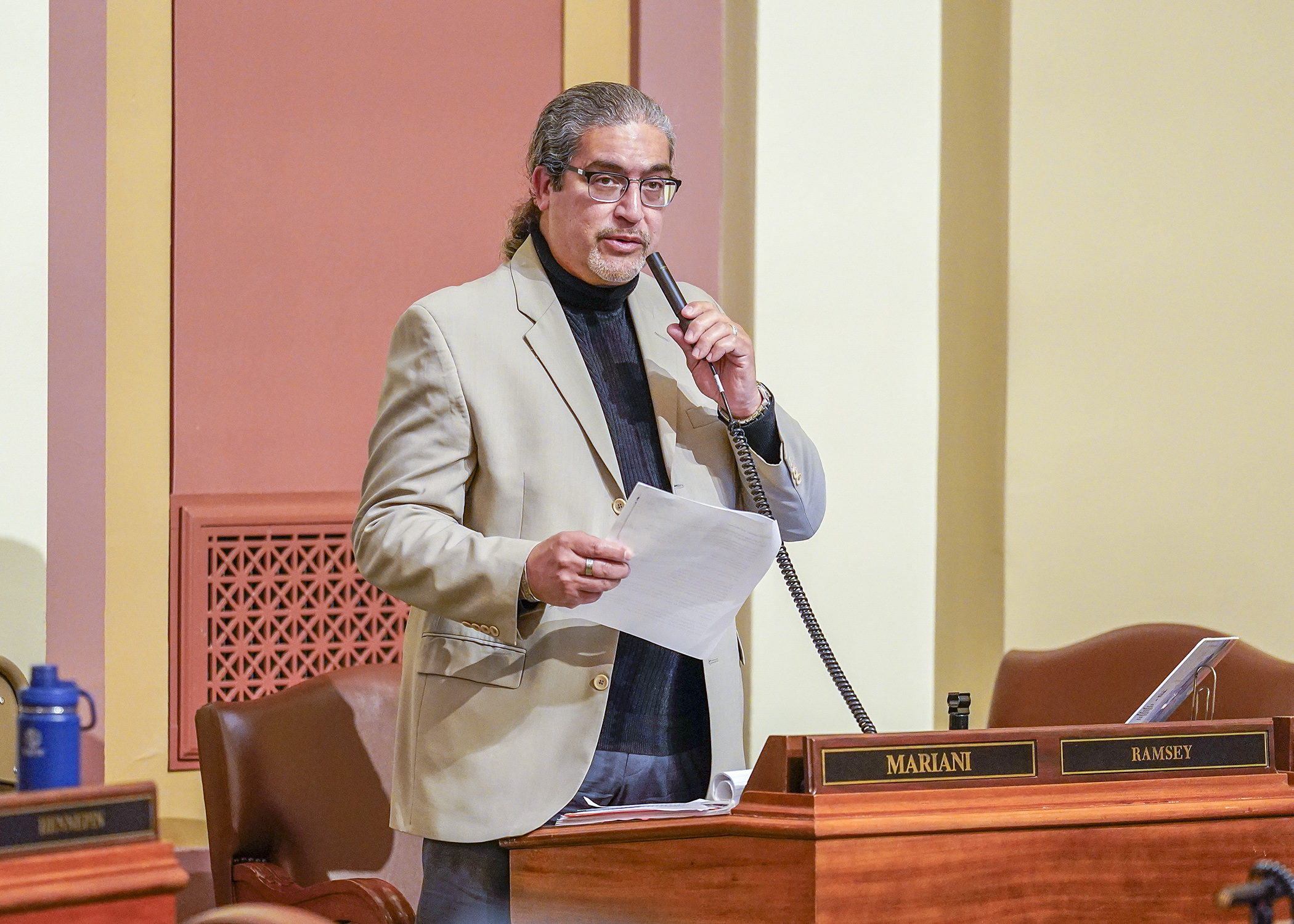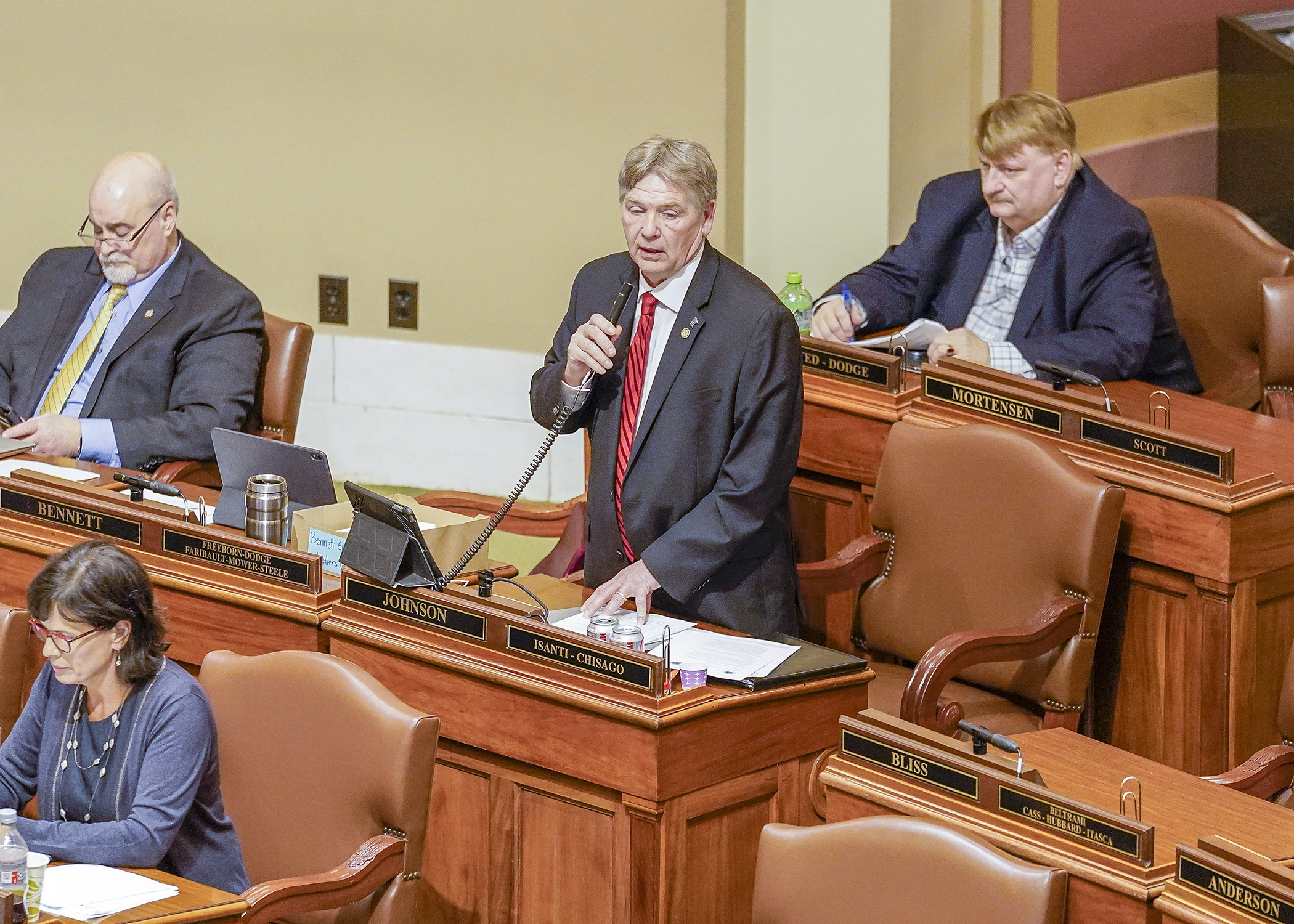Divided House passes omnibus judiciary and public safety bill, sends it back to Senate

At the start of the seven-hour debate on the omnibus judiciary and public safety supplemental budget bill, both Republican and DFL House members stressed that ensuring the safety of Minnesotans is the foremost responsibility of the state.
But each side has significantly different ideas on how best to meet that solemn responsibility.
A House divided along party lines passed HF4608/SF2673*, as amended to substitute the House language, 68-61 Friday and returned it to the Senate, which passed its version 48-19 Monday. A conference committee will likely be needed to construct a compromise bill.
Rep. Carlos Mariani (DFL-St. Paul), chair of the House Public Safety and Criminal Justice Reform Finance and Policy Committee, touted the innovative ways the bill would adopt several new approaches. They include creative ways to help law enforcement meet current staffing challenges, increase crime prevention efforts, help offenders reintegrate into society after release from prison, and address accountability issues when law enforcers break the law.
“We have to modernize how we do public safety, not live in the past,” Mariani said. “That’s the power that lies at the heart of this bill.”
The House bill focuses on community-based crime-prevention programs, including grants for prevention, intervention, mental health and wellness of at-risk juveniles, plus police accountability reforms, such as extending the civil statute of limitations for bodily offenses committed by law enforcement officers, and a requirement that police officer body camera footage be released to families within five days after a deadly force incident and to the public within 14 days.
Sen. Warren Limmer (R-Maple Grove) sponsors the Senate bill that focuses on tougher penalties for crimes, especially violent crimes, such as carjacking and the killing of a police officer; increased funding for recruitment and retention of police officers; a repeal of the five-year cap on probation terms; and a requirement that county prosecutors provide data on felony cases they decline to charge.
House Republicans said several law enforcement advocacy organizations have expressed opposition to the House bill, including the Minnesota Chiefs of Police Association and the Minnesota Sheriffs’ Association, for not sufficiently supporting law enforcement efforts to recruit and retain officers, and for not increasing penalties for violent crimes.
“There is nothing in this bill to hold people accountable,” said Rep. Anne Neu Brindley (R-North Branch).
The omnibus supplemental budget bill would appropriate an additional $340 million in the 2022-23 biennium, with $200 million for public safety programs, including the Department of Corrections, and $140 million for judiciary initiatives and programs.
[MORE: View the spreadsheet]
Funding and policy provisions in the bill
The bill would establish the Public Safety Innovation Board within the Office of Justice Programs in the Department of Public Safety and fund it with $110 million in the 2022-23 biennium.
The money sent to the innovation board would be used to award grants for local community crime-prevention and community policing programs, reentry programs for released offenders, victim services, co-responder programs, juvenile diversion, and other community-based strategies to prevent crime.
The judiciary finance portion of the bill would appropriate $140 million more in the 2022-23 biennium, with $53.4 million going to fund public defenders and $52.2 million for Civil Legal Services (Legal Aid).
Judiciary policy-only provisions now in the omnibus bill came from a judiciary policy bill approved March 31 by the House Judiciary Finance and Civil Law Committee.
Selected amendments adopted
Mariani successfully offered an amendment making technical changes and fixing drafting errors.
Rep. Kelly Moller (DFL-Shoreview) successfully offered an amendment that would make it a gross misdemeanor to “use any device for observing, photographing, recording, amplifying, or broadcasting sounds or events with the intent to capture an image of a private area of an individual without the individual’s consent.”
Rep. Donald Raleigh (R-Circle Pines) successfully offered an amendment that would require each mayor and city administrator of a city of the first class (Minneapolis, St. Paul, Rochester and Duluth) to complete a certified course in incident command under the National Incident Management System within one year of taking office.
Selected amendments not adopted
Rep. Marion O'Neill (R-Maple Lake) unsuccessfully offered an amendment that would have redirected $1.5 million for correctional officer body cameras to pay for scanners capable of screening incoming mail for illegal drugs and other forms of contraband.
 Rep. Brian Johnson speaks to the omnibus judiciary and public safety supplemental finance and policy bill on the House Floor April 29. (Photo by Andrew VonBank)
Rep. Brian Johnson speaks to the omnibus judiciary and public safety supplemental finance and policy bill on the House Floor April 29. (Photo by Andrew VonBank)Rep. Jeff Backer (R-Browns Valley) unsuccessfully offered an amendment that would have taken $100.6 million of the $110 million to fund the Public Safety Innovation Board and redirect it to local governments to upgrade their portable and mobile emergency radios. Backer said rural emergency services are at an extreme disadvantage in responding to calls, and their outdated or non-existent radio equipment results in lives lost.
Mariani said he understands the need for these equipment upgrades in Greater Minnesota, but that it was unwise to pay for them by defunding the innovative policing initiatives that make up “the core of what this the bill is about.”
Rep. Mary Franson (R-Alexandria) unsuccessfully offered an amendment that would have prohibited a nonprofit corporation from providing payment to a person or to a state court in order to satisfy a bail condition determined by the court.
House Minority Leader Kurt Daudt (R-Crown) unsuccessfully offered an amendment that would have placed limits on grants to fund community-based organizations using violence interrupters for crime-prevention efforts.
Withdrawn amendment
Rep. Paul Novotny (R-Elk River) offered an amendment that would have increased penalties for possession of fentanyl, but withdrew his amendment when it was modified by an amendment successfully offered by Mariani.
Related Articles
Search Session Daily
Advanced Search OptionsPriority Dailies
Speaker Emerita Melissa Hortman, husband killed in attack
By HPIS Staff House Speaker Emerita Melissa Hortman (DFL-Brooklyn Park) and her husband, Mark, were fatally shot in their home early Saturday morning.
Gov. Tim Walz announced the news dur...
House Speaker Emerita Melissa Hortman (DFL-Brooklyn Park) and her husband, Mark, were fatally shot in their home early Saturday morning.
Gov. Tim Walz announced the news dur...
Lawmakers deliver budget bills to governor's desk in one-day special session
By Mike Cook About that talk of needing all 21 hours left in a legislative day to complete a special session?
House members were more than up to the challenge Monday. Beginning at 10 a.m...
About that talk of needing all 21 hours left in a legislative day to complete a special session?
House members were more than up to the challenge Monday. Beginning at 10 a.m...